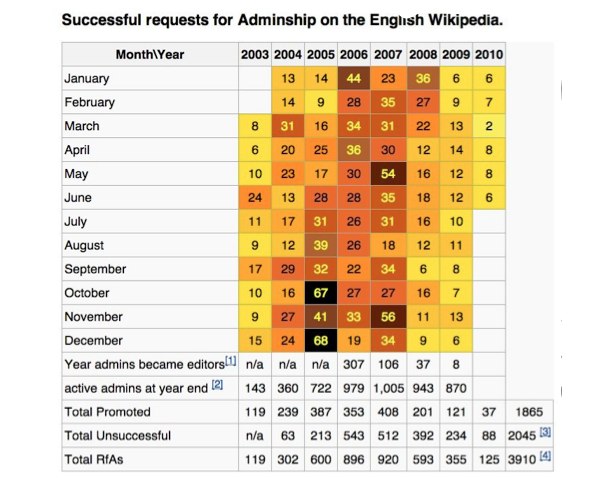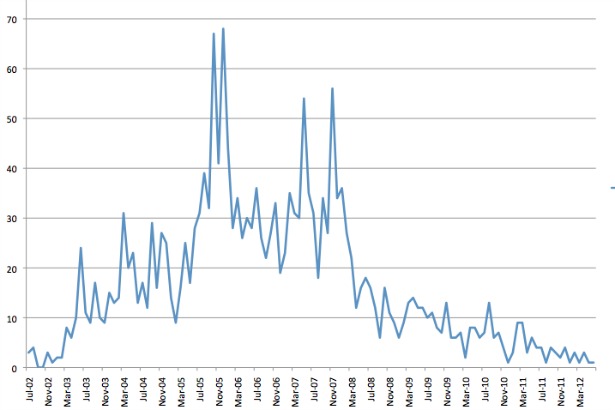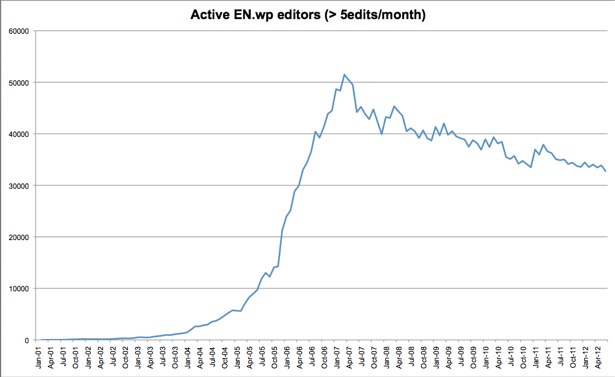3 Charts That Show How Wikipedia Is Running Out of Admins
Very few people are being promoted into the humble, hard-working positions which make Wikipedia work.

Volunteer editing of Wikipedia is on a long decline. The number of editors peaked in 2007 and has been falling since. Lots of people know this.
But while attending Wikimania Friday in Washington, DC -- the conference for the entire Wikimedia movement -- I saw one chart that seemed more dire.
But first some context: In the world of Wikipedia, "administrators" (nicknamed admins or sysops) play the role of custodians. They can delete posts, block editors and protect pages that are in the news or being vandalized. To become a sysop, you must be nominated and undergo an application process. And even after being accepted, you, like the all the site's editors, remain a volunteer.
Now for the charts. In October 2005, Wikimedia promoted 67 people to become sysops. 2005 and 2006 were filled with months like this, where 40 or 50 people would become administrators -- but since then, their numbers have been dropping off. A few years ago, Wikipedia's oldest stewards started to worry: The number of administrators promoted every month was skidding in the high single digits. At the time that happened, this is what the chart of successful admin applications every month looked like:

In June 2010, six people became admins. March of that year saw only two promotions.
There are reasons for this. Andrew Lih, author of The Wikipedia Revolution and a professor of journalism at the University of Southern California, told me the process by which new admins are promoted is arduous and extensive.
"The vetting process is akin to putting someone through the Supreme Court," he said. "It's pretty much a hazing ritual at this point."
In the early days of Wikipedia (Lih became an admin in October 2003), editors were promoted to admin-status almost as a perk: someone else would nominate you, others would affirm, and after about a week you'd have new privileges around the site. "If you proved you weren't a bozo," said Lih, the process was easy.
But the process has gotten more and more intense over the years. Applying to become an admin now involves answering questions about copyright law. You have to write essays about notability and explain how you would act in hypothetical situations. And other Wikipedia editors dig deep into your distant edit history, find any testy discussions you got in and grill you about them.
"It's a rejection of the commitment [Wikipedia editors] put into the project," said Lih. Adminships used to be conferred without much fanfare, but now, even if you seek the position, you're going to get a "gigantic amount of scrutiny."
Here are the numbers today, of new administrators promoted by Wikipedia every month, from July 2002 to June 2012:

For the past few months of 2012, no more than one or two Wikipedia users have been promoted to admin status. This slow trickle of new talent means fewer people perform the encyclopedia's upkeep -- sorting, categorizing, correcting vandalism. And the arduous application process also fails to provide a little karmic reward for involved editors, which means they're less likely to devote time to improving the encyclopedia's structural weaknesses, like how, for example, to adapt the encyclopedia's sourcing to an age of social media.
And the drip-drip of incoming admins does signal a drip-drip of new editors of any kind, even if that tailing off is less dire. Here is total history of general Wikipedia editors per month:

The encyclopedia isn't starving for stewardship or editorship yet. Last week's Wikimania conference filled rooms and rooms of George Washington University's student center with chipper, engaged Wikipedians (though they remain, alas, mostly male).
But the project worries about falling editors. The overarching organization that runs Wikipedia, Wikimedia, affirmed in its annual report for 2010-2011 that "declining participation is by far the most serious problem facing the Wikimedia projects." Wikimedia is planning on beta-testing a new WYSIWYG text editor last this year, to make it easier for new authors to join the Wikipedia legion. And it's adjusting design elements to make it clearer to new visitors that Wikipedia can be edited: the site's ubiquity is such that many web users just don't know about its greatest feature.
It makes sense. Back in 2008, a study led by Spanish researcher Felipe Ortega found that there was great inequality between the number of people who edited Wikipedia and the number who read it. The study made headlines at the time; it initiated the first round of "Wikipedia is dying!" stories. But Ortega's team also found that the inequality between editors and readers would "trend to stable patterns of inequality in the long run."
We're now in the long run: the end of the first era of social media, Web 2.0's middle age. Among tech types, disruption tends to be the word. But what Wikipedia now requires is the careful, curatorial work of stewardship. We're about to see whether the web, so good at novelty, can also succeed at TLC.